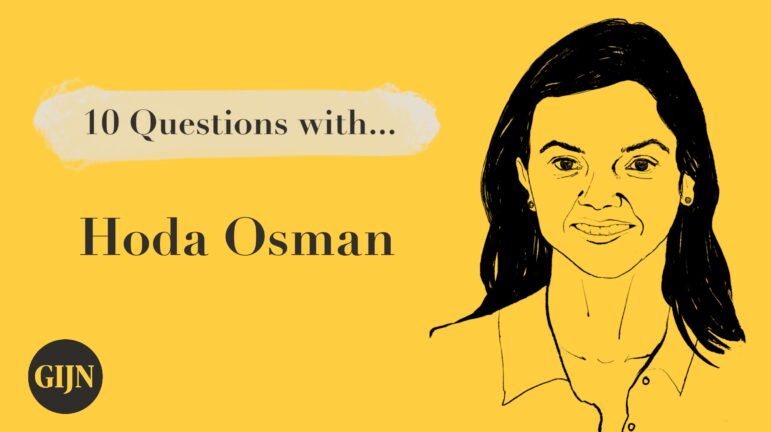

Illustration: Smaranda Tolosano for GIJN
Straddling Two Worlds as an Investigative Journalist: ARIJ’s Hoda Osman
Ever since the Arab Spring set off a wave of pro-democracy protests and uprisings more than a decade ago, political transformations and increased repression in the Arab world have made investigative journalism all the more crucial — and difficult — in the region.
Getting people to agree to an interview is a challenge in many Arab countries. People often fear talking to journalists.
One of its leading supporters is Hoda Osman, executive editor at Arab Reporters for Investigative Journalism (ARIJ), which provides journalists in the MENA region with training, networking, and a “collaborative ecosystem” to help foster better reporting.
Osman, who was born in Egypt, has reported on jihadism, single mothers in the Arab world, and migration, as well as human rights stories. As a freelance investigative journalist based in New York, Osman also works on uncovering crucial stories from the United States while closely monitoring and helping to bolster the investigative journalism scene in the Middle East and North Africa. One of her latest stories was a collaborative project that linked the two regions, a story looking at allegations of mistreatment at US military bases in Gulf states.
Osman has worked at the ABC News and CBS News investigative units, and as a correspondent at the AP, PBS, France 24, and other international outlets. In 2008, through the International Center for Journalists, she helped develop an investigative journalism course for Arab journalists. She has taught investigative reporting across the globe and is currently the president of the Arab and Middle Eastern Journalist Association (AMEJA).
In this Q&A, part of GIJN’s ongoing interview series with leading investigative journalists, Osman shares her experience working with journalists in the Arab world, along with some lessons and advice she has received on her journey.
Last year, Osman and ARIJ collaborated on an in-depth investigation into human trafficking on US military bases in Gulf countries. Image: Screenshot, NBC News
GIJN: Of all the investigations you’ve worked on, which has been your favorite and why?
Hoda Osman: Tough question. Working in Fear was the biggest story I worked on last year and one of my favorites. It was an ICIJ collaboration with NBC News and The Washington Post exposing potential labor trafficking practices on US military bases in the Gulf countries. There’s strength in different journalists teaming up and using their unique expertise and knowledge to uncover wrongdoing.
GIJN: What are the biggest challenges in terms of investigative reporting in the region you report on?
Osman: In Arab countries, the obvious challenges are related to access to information, persecution, and safety, especially in conflict zones. But there are other less obvious challenges that are often overlooked. I worked with a reporter who, due to the frequent power cuts, could only use her laptop for an hour and 20 minutes at a time… most of our time was spent tackling internet problems rather than our actual work. Given that investigative reporting requires extensive research and focused work, these issues seriously disrupt the process.
GIJN: What’s been the greatest hurdle or challenge that you’ve faced in your time as an investigative journalist?
Osman: I moved to the United States over 20 years ago and while I travel to Arab countries frequently for work, most of my professional experience has been while based in New York. I can’t compare any challenges I’ve had to those faced by the Arab journalists I work with.
GIJN: What is your best tip or trick for interviewing?
Osman: Getting people to agree to an interview is a challenge in many Arab countries. People often fear talking to journalists. I make sure to thoroughly research the person before approaching them for an interview. If they are not responsive, I try to strike a balance by being persistent without seeming so pushy that I might scare them away.
I am in awe of the Arab investigative journalists I work with… They keep at it, continue digging deeper, are eager to learn, and confront the risks with courage and humility.
GIJN: What is a favorite reporting tool, database, or app that you use in your investigations?
Osman: It may seem simple, but it’s Google Docs and Sheets. Being able to add comments and engage in conversations inside the documents and working in “suggestion mode” is extremely helpful especially when working with multiple journalists on cross-border collaborations.
GIJN: What’s the best advice you have received thus far in your career, and what words of advice would you give an aspiring investigative journalist?
Osman: To be clear and honest with sources about the story from the start. In addition to that, another piece of advice I give aspiring investigative journalists is to expose themselves to outstanding reporting in various formats worldwide and delve into the backstory: How did the reporters do it? Are there any interviews with the reporters on the methods used? Having translation tools available today makes this easier.
GIJN: Who is a journalist you admire, and why?
Osman: There are many internationally recognized journalists whose work I highly admire. However, I must answer this question by expressing how consistently I am in awe of the Arab investigative journalists I work with. In spite of the obstacles mentioned earlier, they keep at it, continue digging deeper, are eager to learn, and confront the risks with courage and humility.
When working on an investigative story I am so immersed in it that it’s hard to fully disconnect. I find that meditating and staying physically active gives balance to my days.
GIJN: What is the greatest mistake you’ve made and what lessons did you learn?
Osman: When I was in college in Cairo, I worked at the school’s newspaper on a story about bootleg alcohol. I went undercover and pretended I wanted to purchase alcohol from a man who had been imprisoned for selling it illegally in the past. I realized later how risky, and possibly unethical, this was. Going undercover should be a last resort, when the information can’t be obtained any other way. Thorough planning and a comprehensive risk assessment then become imperative parts of the process.
GIJN: How do you avoid burnout in your line of work?
Osman: Avoiding burnout is quite a challenge, to be honest. In my case, the time zone and weekend differences with Arab countries means I find myself constantly engaged. Even if I take time off, when working on an investigative story I am so immersed in it that it’s hard to fully disconnect. I find that meditating and staying physically active gives balance to my days. I also try to schedule my breaks in between stories so I can really unplug.
GIJN: What about investigative journalism do you find frustrating, or do you hope will change in the future?
Osman: It can be incredibly frustrating when you know the information is out there, in certain documents or from a source, yet despite your best efforts you are still unable to access it. I do hope for more effective access to information laws and awareness about the public’s right to information in Arab countries.
Additional Resources
How a BBC Investigation Exposed the Impact of Gas Flaring on Iraqi Communities
How They Did It: Tracking Phosphate Smuggling From Syria Into Europe
2022’s Best Investigative Stories from the Arab World
Nader Durgham is a journalist based in the UK. He worked with The Washington Post in Beirut for two years, covering Lebanon and Syria, including coverage of the Beirut Port explosion, the economic crisis, and political and humanitarian issues across Syria. A graduate of the American University of Beirut, he is studying for a Masters in Democracy and Comparative Politics at University College, London.









